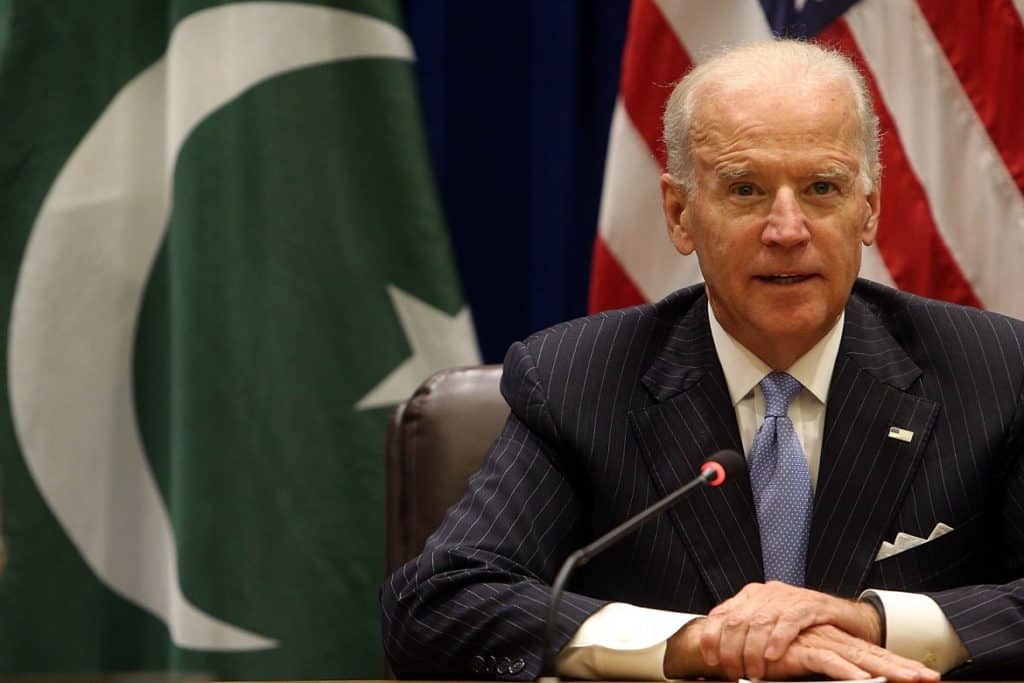By Rana Danish Nisar
A lot of rumours, chatter, gossip and buzz comes from political pundits, strategic think tanks and others regarding President Biden’s South Asian policy, particularly towards the two nuclear powers India and Pakistan.

Academic intellectuals and strategic studies specialists are just waiting for the US security strategy under the Biden administration. Along with countering the rise of China, international relations intellectuals have argued that it will be a paradigm shift in US policy, as in the CENTCOM (United States Central Command), with some particular dominoes, namely countering the Russian resurgence in Central Asia, offsetting China’s growing influence in South Asia, Indo-Pacific and beyond, deteriorating Iran, solving the Afghanistan issue, and creating powerful alliances, especially in the Middle East, within the framework of Israel and India. But only time will paint the real picture.
Focusing on US-Pakistan relations, it may be possible that a profound paradigm shift in the ties of the two states will take place. The entire Cold War era is testimony to the closeness of the two countries based on their interests, but with the collapse of the Soviet bloc (USSR), the Asian security order is in flux. Now, Asia is the central part of world politics, where various global and regional players are competing to establish their influence. In addition to China, India and Japan have assumed the role of key regional players.
The United States is the most powerful competitor, followed by Russia as an external actor. With the crumbling of the socialist bloc, the US has shaped its security policies, changed its priorities, chosen new alignments and role in light of this new position in global affairs, and old rivals India and China have emerged as strong regional powers with impressive economic growth and play their imperative role in the Asian theatre.
Due to China’s rapid economic growth, the modernisation of its armed forces, as well as its assembly position in the Asian region and its maritime transport routes, many American analysts see China as the most dangerous competitor, and therefore look to India as a balancer to China in the region. India’s practice of democratisation, large market, growing economy, strategic importance with regard to the Indian Ocean and sea transport routes, nuclear power, and potential to contain China have brought it closer to the US. As a result, China has remained a factor in Indo-US relations in the contemporary era. The ‘China versus India’ economic, strategic, past rivalry and border issue, along with the ‘China versus US’, indicate that New Delhi and Washington are building a powerful nexus against the common threat (China) and make New Delhi a potential counter-power against China in the future.
China perceives this Indo-US nexus as part of the US policy of ‘hedging’ to contain ‘China’s power’ and create a balance of power in Asia with the help of its natural ally India. Given the importance of the China factor, the US shifted its tilt from Pakistan to India and now India has become America’s ‘Major Defence Partners’ and ‘Net-Security Provider’ in Asia.
The growing intimacy between the two democracies (US and India) has reduced the importance of Pakistan in the security agendas of the pentagon. Due to the ‘strategic romance’ between the US and India, the ‘strategic divergence’ between the US and Pakistan has reached its highest levels.
The seed of “trust deficit” in Pakistan-US relations, which was sown by Clinton before he left the oval office while giving extra importance to India, has been cultivated by his successors, who are giving fresh water to this seed for its growth. “You are either with us or against us, if you are not with us, be prepared for the consequences”; this kind of statement further reduced US-Pakistan relations in the early and mid-2000s. The US signing of the 2005 defence framework with India, further pushed US-Pakistan ties towards greater estrangement. Drone attacks in Pakistani tribal areas and America’s interference in Pakistan’s internal affairs under Bush have put Pakistan’s security and sovereignty at stake.
American drone attacks have killed hundreds of people and undermined Pakistan’s fragile economy and social structure. The air strikes in Abbottabad (Pakistan) and the killing of Osama bin Laden by the US were a violation of Pakistan’s sovereignty. President Obama improved the relations with India, through the DTTI and the 2016 10-year defence framework, LEMOA-2016. Meanwhile the American offensive approach, under the Obama administration, against Islamabad, provided further strategic offensive opportunities for India to destabilise and de-securitise Pakistan.
Moreover, Trump’s exceptional bowing to India: “I love Hindu, I Love India, Modi is great Leader”, further distanced the US from Pakistan. The COMCASA-2018, ISA-2019, BECA-2020 security agreements and the $3.5 billion 2020 defence agreement between India and the US made the Pakistan-US estrangement stronger.
Currently, Biden is in the Oval Office, and being a mature denizen of power politics, former Vice President and now President of the United States, he should act like a mature man with full responsibility in dealing with Pakistan and India.
Indeed, Biden knows the strategic importance of Pakistan, particularly in the ongoing Afghan ‘peace process’. Moreover, President Biden should know the complex nuclear politics of South Asia and the arch-antagonism of India and Pakistan, both of which are nuclear states and strategic rivals. The extra US care for India may harm Pakistan’s security and interests. It needs to be emphasised that the stability and peace of South Asia is intertwined with the relationship between Pakistan and India, and the rise of one of them against the other can cause dangerous catastrophe. The Biden administration should be concerned about this harsh reality. Moreover, the US under Biden should facilitate and treat Pakistan in the same manner as India.
It seems that Pakistan-US relations will be the same as they are now, there will be no paradigm shift in relations, but the Biden administration should think once that now the world politics has been changed. Power politics has been shifted to geo-political, geo-economic, geo-strategic and all states are dependent on each other in this global politics.
The US still needs Pakistan to achieve its interests, especially with the recent peaceful completion of the peace process in Afghanistan, and the withdrawal of US forces from Afghanistan. In this matter, Pakistan can be a good fit for the US. Moreover, in reducing the tension between Tehran and Washington, Pakistan can provide its role as a third party or meditator.
Furthermore, as in the 1970s, Pakistan can also play its essential role in reducing tension and lack of trust between the US and China, the most powerful entities in current global politics. Moreover, Pakistan’s role in countering and destroying the evil of terrorism is also recognisable and appreciated. The US should know this reality and strengthen its ties with Pakistan. Biden should write India and Pakistan on the same page.
To sum up, today the world stands on a crossroads, any incident can upset the harmony and cause disaster for the world. The US, being a responsible state and a superpower, should deal equally with India and Pakistan, in order to avoid any unintended incident in the region. The Biden administration should thoroughly review the US policy towards Islamabad with a view to building stronger relations with Pakistan by removing all disagreements, misunderstandings and doubts.
Rana Danish Nisar The author is a PhD (International Relations) Student at the School of Politics and International Studies (SPIS). He holds Mphil in (International Relations), Masters in (Pakistan Studies), and Masters in (International Relations) degrees. He won acceptance Harvard Project for Asian and International Relations HPAIR (USA), 2017. His research interests are broadly in South Asian Affairs, South Asia Geo-Politics, India-Pakistan Relations, South Asian Nuclear Politics, US and South Asia, Indian Ocean, Security studies, South Asian developments studies.
(The views expressed in this article belong only to the author and do not necessarily reflect the editorial policy or views of World Geostrategic Insights).







